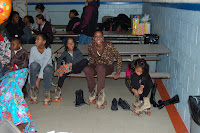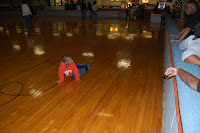
Saturday, December 29, 2007
Saturday, December 15, 2007
Merry Christmas from the DFGs (2007)
Saturday, December 01, 2007
Aunt Donna tells us about Kwanzaa (December)

Kwanzaa is a non-religious African American holiday which celebrates family, community, and culture. It is celebrated for seven days: December 26 - January 1. Dr. Maulana Karenga, professor and chairman of Black Studies at California State University, created Kwanzaa in 1966.
After the Watts riots in Los Angeles, Dr. Karenga searched for ways to bring African-Americans together as a community. He founded US, a cultural organization, and started to research African "first fruit" (harvest) celebrations. Dr. Karenga combined aspects of several different harvest celebrations, such as those of the Ashanti and those of the Zulu, to form the basis of Kwanzaa.
Kwanzaa means "first fruits" in Swahili. Each family celebrates Kwanzaa in its own way, but celebrations often include songs and dances, African drums, storytelling, poetry reading, and a large traditional meal. On each of the seven nights, the family gathers and a child lights one of the candles on the Kinara (candleholder), then one of the seven principles is discussed. The seven principles are values of African culture which contribute to building and reinforcing community among African-Americans.
Seven Principles of Kwanzaa
Umoja (unity) to strive for and maintain unity in the family, community, nation and race.
Kujichagulia (self-determination) to define ourselves, name ourselves, create for ourselves and speak for ourselves.
Ujima (collective work and responsibility) to build and maintain our community together and make our sister's and brother's problems our problems and to solve them together.
Ujamaa (cooperative economics) to build and maintain our own stores, shops, and other businesses together.
Nia (purpose) to make our collective vocation the building of our community to restore our people to their traditional greatness.
Kuumba (creativity) to do as much as we can to leave our community more beautiful and beneficial than we inherited it.
Imani (faith) to believe with our hearts in our people, our parents, our teachers, our leaders and the righteousness and victory of our struggle.
Subscribe to:
Comments (Atom)











































